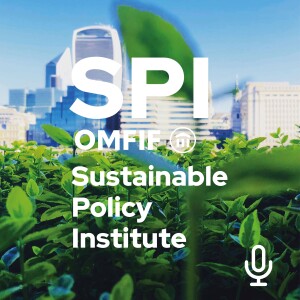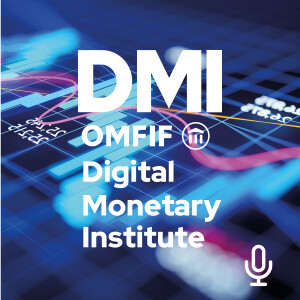
247.7K
Downloads
594
Episodes
Subscribe to the OMFIF podcast for the latest news and insight on financial markets, monetary policy and global investment themes. Published weekly, the podcast features input from a range of academic experts, central bankers and investment professionals. Visit our website at www.omfif.org.
Subscribe to the OMFIF podcast for the latest news and insight on financial markets, monetary policy and global investment themes. Published weekly, the podcast features input from a range of academic experts, central bankers and investment professionals. Visit our website at www.omfif.org.
Episodes

Thursday Apr 27, 2023
Natural capital funds and driving financial flows towards biodiversity
Thursday Apr 27, 2023
Thursday Apr 27, 2023
Nature-positive finance is rising on investors’ agendas, yet uncertainty of how to scale up nature-positive flows remains. To help drive nature-based capital, Guernsey Financial Services Commission has developed a natural capital fund. William Mason, director general and Alison Gavey, director of Authorisations and Innovation Division at GFSC, join Emma McGarthy, head of OMFIF’s Sustainable Policy Institute to discuss criteria, targets and the commercial orientation of the fund, and what issuers and investors need to consider when identifying investable nature-based projects

Thursday Apr 20, 2023
Central bank reserves management in 2023
Thursday Apr 20, 2023
Thursday Apr 20, 2023
Research is well underway for the 10th edition of OMFIF’s Global Public Investor – our flagship publication which explores the investment strategies of central bank reserves managers. Ellie Groves, Managing Director of OMFIF’s Economic and Monetary Policy Institute, speaks to Nikhil Sanghani, OMFIF’s Managing Director of Research, on:
- The aims of the GPI
- Key findings from previous reports
- A sneak peak of results from the 2023 survey, based on responses from over 50 central banks at the time of recording.
The full results will be revealed at the launch on 27 June. Find out more here: https://www.omfif.org/global-public-investor/

Thursday Apr 13, 2023
How are central banks adapting their data management to thrive in a digital age?
Thursday Apr 13, 2023
Thursday Apr 13, 2023
The rapid pace of technological change is matched by the ever-evolving risks to financial stability and the global economy, as presented by the Covid-19 pandemic, as well as the acceleration of climate change and the volatility of digital financial assets. It is within this environment that central banks need to harness technology to capture, handle, integrate and use new data effectively.
In this podcast, we explore key findings of an upcoming report assessing the challenges and opportunities facing central banks in the digital age. Specifically, our experts will dive into the operating models, technological platforms and integrated data strategies central banks are pursuing to thrive in a digital age.
Host: Lewis McLellan, Editor, Digital Monetary Institute, OMFIF
Guest: Oliver Berger, Head of Middle East & North Africa, State Street Corporation
- The management of efficient and organic data governance
- How are central banks approaching data transformation?
- What challenges do they face when ingesting, aggregating and analysing key economic and investment data from across their key functions?
- Which technologies or enterprise-wide solutions could be used to help mitigate these challenges?
- Follow-up question on cloud migration: How do central banks manage data sovereignty laws when considering migrating data to the cloud?
- The intersection of Process, People and Technology (PPT) from end to end

Thursday Apr 06, 2023
Africa: refinancing risks and debt distress
Thursday Apr 06, 2023
Thursday Apr 06, 2023
Gregory Smith, emerging markets fund manager at M&G Investments, speaks to Burhan Khadbai, head of content at OMFIF’s Sovereign Debt Institute, about the refinancing risks that African sovereigns are facing with a wall of bonds set to mature over the next few years.
Smith talks about where the risks are most concentrated and the difficulty many African sovereigns with low credit ratings will face in accessing the markets. He also talks about the debt restructuring talks in Ghana and Zambia and the role of debt-for-nature swaps as a way of reducing high debt burdens and boosting investment in environmental conservation.
Recorded on 17/03/23

Thursday Mar 30, 2023
UK budget: the hardest debt decisions await
Thursday Mar 30, 2023
Thursday Mar 30, 2023
With strains on the public purse and the need to keep the UK’s risk premium down after September 2022’s reckless mini-budget, Chancellor of the Exchequer Jeremy Hunt had limited room for largesse in his 15 March budget.
There were some welcome pro-growth measures to help the supply-side of the economy. But while he patched a fiscal hole, the borrowing outlook looks much tougher – meaning the hardest debt decisions await whoever’s in power after 2024. Neil Williams, chief economist and Taylor Pearce, senior economist, discuss what’s in store for the UK.
See also: UK budget patches a hole but borrowing outlook much tougher - OMFIF.

Tuesday Mar 21, 2023
Cybersecurity and cloud migration
Tuesday Mar 21, 2023
Tuesday Mar 21, 2023
As our reliance on digital infrastructure grows, the dangers posed by more frequent and sophisticated cyberattacks grow too. Nataraj Nagaratnam, chief technology officer at IBM, joined Lewis McLellan, editor of OMFIF’s Digital Monetary Institute, to discuss the growing risks to our financial ecosystem and the tools that cloud providers can offer to help mitigate them. They also explored how systems can be designed around customer preferences while still offering the highest standard of security.

Tuesday Mar 14, 2023
Climate change risks for financial stability
Tuesday Mar 14, 2023
Tuesday Mar 14, 2023
Pedro Duarte Neves, adviser for the board of directors of Banco de Portugal, joins Katerina Atkins, programme coordinator at OMFIF’s Sustainable Policy Institute, to discuss the critical topic of dealing with climate risks for financial stability. They share insights into the complexities surrounding the shift towards a low-carbon economy and the role played by central banks and policy-makers in tackling climate risks both in Europe and globally. They examine climate scenario analysis and stress testing tools and how to effectively communicate the results of climate risk assessments.
If you are interested in learning more about the topic and meeting key policy-makers, regulators, public and private sector investors and ESG experts, join us for the Sustainable Policy Institute symposium on 22-23 March in London. Register here: https://www.omfif.org/spisymposium2023/
The views and opinions expressed the ones of the interviewee and do not necessarily reflect those of Banco de Portugal or the Eurosystem.

Thursday Mar 09, 2023
Insuring impactful fund disbursements for efficient public good
Thursday Mar 09, 2023
Thursday Mar 09, 2023
Public finance management systems are a means of delivering development outcomes through a governance system, so assuring that fund disbursements are impactful is crucial. The inability of current systems to accurately measure and track key indicators creates operational challenges and overcoming them is critical in facilitating effectual public good. Representatives from USAID and EY join OMFIF to discuss some of the challenges unfolding in aid projects and how they can be resolved.

Wednesday Mar 08, 2023
Why you shouldn’t miss the Sustainable Policy Institute symposium
Wednesday Mar 08, 2023
Wednesday Mar 08, 2023
Join OMFIF's Emma McGarthy and Katerina Atkins as they give a sneak peek into what to expect from this year's highly anticipated Sustainable Policy Institute symposium. They delve into the main topics on the agenda and look forward to the keynote speakers who will be sharing their expertise.
The SPI symposium will take place on 22-23 March in London and will examine the role of monetary policy, climate risk, regulation and disclosure. It will address practical challenges in driving sustainable financial markets to achieve net zero. The event will convene a global network of key policy-makers, regulators, public and private sector investors and ESG experts.
And the best part? You can still register to participate! Don't miss out – find more information and register here: https://www.omfif.org/spisymposium2023/

Tuesday Mar 07, 2023
How central banks can drive gender equality
Tuesday Mar 07, 2023
Tuesday Mar 07, 2023
Margarita Delgado, deputy governor of Banco de España, speaks to Emma McGarthy, head of OMFIF’s Sustainable Policy Institute, on the role of central banks in efforts to bring women into leadership positions in the financial sector. They discuss the policies and frameworks required, the initiatives and strategies implemented by Banca de España to close leadership gaps and how improving diversity can drive better returns for investors.
